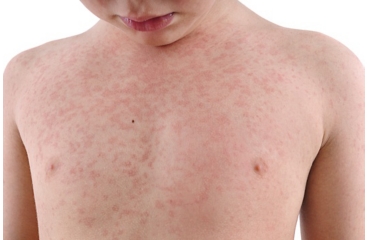
What is a penicillin allergy?
A penicillin allergy is an allergic reaction that your body has to these antibiotics. It can range from mild to severe. Common reactions include rashes and swelling. But a severe reaction can cause trouble breathing or other serious problems. This can be deadly if not treated right away.
If you are allergic to penicillin, you may also react to antibiotics like it. These include ampicillin and amoxicillin. Ask your pharmacist or doctor about these medicines.
Many people who think that they have an allergy to penicillin don't have one. They may have a side effect instead. Tests can show if you have a severe allergic reaction to penicillin that affects your whole body (anaphylactic reaction). These tests cannot predict allergic reactions that are not anaphylactic, such as a rash.
You're more likely to have a true penicillin allergy if you've had:
- Hives or swelling that appeared right after you took the medicine.
- A severe reaction to penicillin in the past.
- A positive skin test for penicillin allergy.
What are the symptoms?
A mild reaction can cause:
- A rash.
- A few hives.
- An itchy nose or mouth.
A severe reaction to penicillin can cause an anaphylactic reaction. This can be deadly. Symptoms may include:
- Raised, red areas (hives) all over your body.
- Swelling of the throat, mouth, lips, or tongue.
- Trouble breathing.
- Passing out (losing consciousness).
- Belly pain, nausea, vomiting, or diarrhea.
A severe reaction can also include a severe rash. The rash may have blisters and peeling.
The symptoms of a severe allergic reaction most often happen very soon after you take the medicine. But allergic reactions can happen later. If the reaction is later, you might have a rash, a fever, or other symptoms.
How is an allergic reaction to penicillin treated?
The first thing to do to treat a penicillin allergy is stop taking the medicine. A mild reaction often can be treated with over-the-counter antihistamines. These medicines stop swelling and itching. Some people may need prescription medicine. For a severe reaction, you may need a shot of epinephrine or other medicines.
How can you care for yourself at home?
Avoid penicillin and medicines like it. Be sure that anyone treating you for any health problem knows what medicines you are allergic to. Take medicines for the allergic reaction as directed. If you are at risk for a severe allergic reaction, always have an epinephrine shot with you. Make sure it has not expired.
Follow-up care is a key part of your treatment and safety. Be sure to make and go to all appointments, and call your doctor or nurse advice line (811 in most provinces and territories) if you are having problems. It's also a good idea to know your test results and keep a list of the medicines you take.
Where can you learn more?
Go to https://www.healthwise.net/patientEd
Enter D159 in the search box to learn more about "Learning About Penicillin Allergy".
